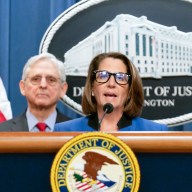Two decades after its reporting helped fuel the worst bloodshed in Europe since World War II, Serbia’s state-run television has apologized to viewers throughout the former Yugoslavia for serving as the key propaganda tool of late autocratic leader Slobodan Milosevic in the 1990s.
Radio Television of Serbia — or RTS — said in a statement posted on its website Tuesday that the station’s program was “almost constantly and heavily abused” by Milosevic’s regime with the aim of discrediting his political and ethnic opponents and spreading official propaganda.
The broadcaster “apologizes to the citizens of Serbia and those of neighbouring countries who were subject to insult, slander and what would now be termed as hate speech,” the statement added.
The apology is the first by Serbia’s state broadcaster, which was one of the symbols of Milosevic’s era and a key pillar of his heavy-handed, decade-long rule, marked by wars in Slovenia, Croatia, Bosnia and Kosovo, international isolation and economic decline.
Some said it was not enough, considering the damage created by the station’s former warmongering policies.
Liberal politician Marko Karadzic described the apology as a “positive step” but said the television’s managing board did not distance itself clearly enough from the past.
“RTS’ program was an organized campaign of support to the policies of extinction and violence which we cannot view as insult or slander,” Karadzic said.
The Independent Journalists Association said that while the statement was welcome, those who took part in the spreading of warmongering propaganda have not faced consequences and should be put on trial.
When he came to power in the late 1980s, Milosevic appointed trusted associates to head the national broadcaster, firing longtime professionals and turning it into his regime’s mouthpiece.
The station blatantly spread Milosevic’s nationalist propaganda, portraying Serbs as the victims of the ethnic attacks in the former Yugoslavia and whipping up nationalism that helped lead to the wars.
While reporting from warfronts, RTS journalists fueled anti-Croatian hysteria by saying Croat pro-independence fighters cut off fingers of Serb children and made necklaces out of them, and that Croats suffocated Serb babies using plastic bags in a nursery in eastern Croatia.
With the post-Communist breakup of Yugoslavia, Serbs rebelled against the independence of Croatia and Bosnia, triggering the bloodshed that left more than 100,000 people dead and millions homeless before ending in Western-brokered peace agreements in 1995.
In 1998, Milosevic launched the brutal war in Kosovo to try to stop Albanian separatists, prompting NATO to intervene in 1999.
Serbia’s state TV brooked little opposition during that period, accusing anyone opposing Milosevic or the war of being foreign mercenaries and traitors who are working against the country’s interests.
The propaganda was so intense that it led to major anti-government protests in March 1991 in Belgrade, during which two people were killed in what was the first popular uprising against Milosevic’s rule. It also prompted NATO in 1999 to declare the broadcaster a legitimate target, and it was bombed during the alliance’s air war, killing 16 RTS employees.
The same building caught fire in 2000, when thousands of pro-democracy demonstrators stormed its Belgrade headquarters during an uprising that eventually toppled the autocrat and paved the way for his extradition to a U.N. war crimes tribunal to face a genocide trial, where he died in 2006.
With the breakup of the former Yugoslavia, RTS is rarely watched in the rest of the former Yugoslavia.
In Serbia, nationalist opposition parties complain the state TV remains staunchly pro-government, this time favouring the pro-Western authorities who are seeking to move Serbia closer to the European Union. RTS has dismissed the criticism.
The station conceded in its statement that “during the tragic events of the 1990s, RTS with its reporting on many occasions hurt the feelings, moral integrity and dignity of the Serbian citizens, intellectuals, members of political opposition, journalists, ethnic and religious minorities, as well as certain neighbouring peoples and states.”
It added the station will in the future promote “the rule of law, social justice, civic democracy, human and minority rights and freedoms.”
Zarko Trebjesanin, a psychologist who is a member of the RTS’ managing board, said apologies such as this one take time:
“Could it have come earlier? Probably,” he said. “But I think it is never too late.”















